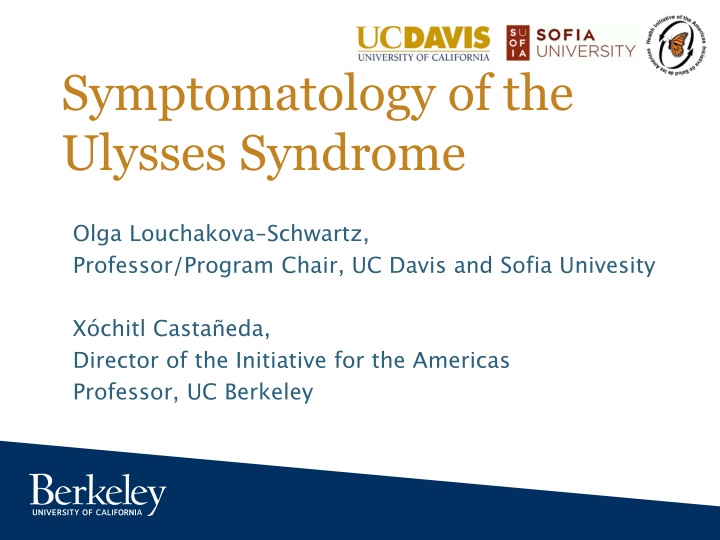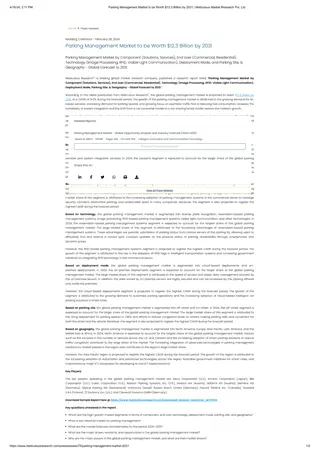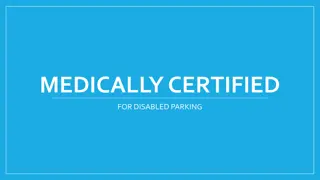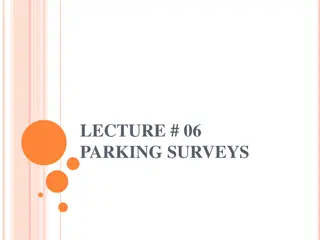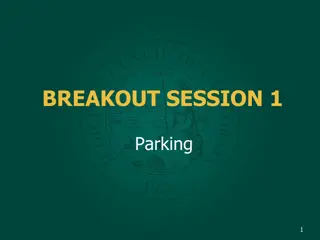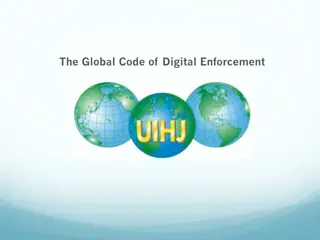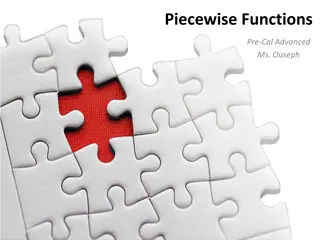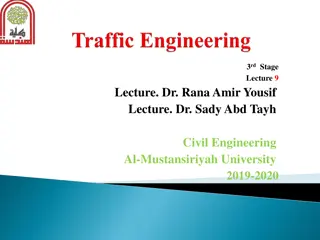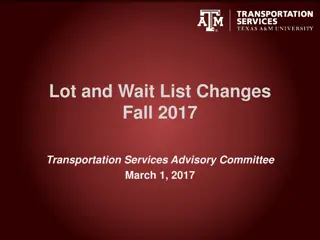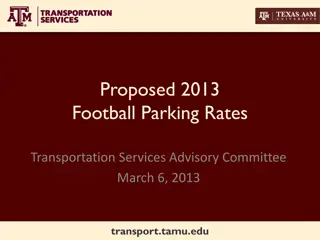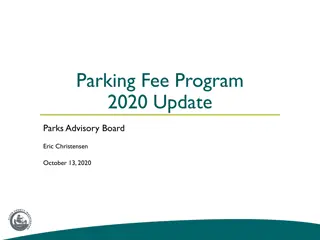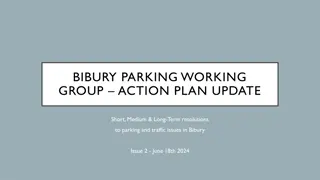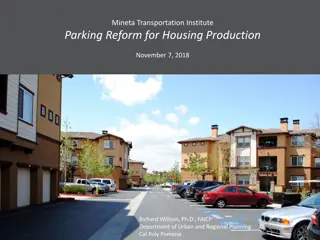Civil Parking Enforcement in Oxfordshire County Council
Oxfordshire County Council is now responsible for civil parking enforcement, replacing Thames Valley Police. This enforcement allows for issuing Penalty Charge Notices to violators of parking regulations, focusing on areas like double yellow lines, loading bays, and resident parking schemes. The process involves a contract with Conduent Public Sector (UK) Ltd and aims to improve traffic flow and community management by addressing parking hotspots and introducing controlled parking zones. However, challenges persist with misallocated restrictions and identified problem sites that require further attention and community engagement for resolution.
Download Presentation

Please find below an Image/Link to download the presentation.
The content on the website is provided AS IS for your information and personal use only. It may not be sold, licensed, or shared on other websites without obtaining consent from the author.If you encounter any issues during the download, it is possible that the publisher has removed the file from their server.
You are allowed to download the files provided on this website for personal or commercial use, subject to the condition that they are used lawfully. All files are the property of their respective owners.
The content on the website is provided AS IS for your information and personal use only. It may not be sold, licensed, or shared on other websites without obtaining consent from the author.
E N D
Presentation Transcript
Symptomatology of the Ulysses Syndrome Olga Louchakova-Schwartz, Professor/Program Chair, UC Davis and Sofia Univesity X chitl Casta eda, Director of the Initiative for the Americas Professor, UC Berkeley
Migration is a natural phenomenon for all living species, including human beings. However, the kinds of migration differ through history. At present, migration is often characterized by extereme and chronic stress exceeding the human capacity of adaptation. Joseba Achotegui, Psychiatrist from Barcelona, termed this condition the Ulysses Syndrome, by the name of Greek hero who can be viewed as an archetype of involuntery migration.
Stressors and Their Effects in the Ulysses Syndrome
Stressor 1 Loneliness and the enforced separation, especially in the case when an immigrant leaves behind his or her spouse or young children. Effects of this stressor: increased risk of cardiovascular morbidity and mortality (Cruz et al. 2016) Negative effect on cognitive function and connection with increased prevalence of psychosis (Badcock et al. 2015) Increased risk of depression (Jinhui et al. 2015, Gan Pei et al. 2015) notice interdependent self-construal Etc.
Stressor 2 The sense of despair and failure that is felt when the immigrant, despite having invested enormously in the emigration (economically, emotionally, etc.), does not succeed in bringing together minimal conditions necessary to succeed. Culturally constituted factor produces feelings which themselves become endogenous stressors Sleep disruption (Nota et al., 2016) Failure of defense mechanisms such as counter-actual thinking etc. Rumination (Daches et al. 2015)
Stressor 3 In addition to these difficulties, the immigrant has to fight merely to survive: to feed himself, to find a roof to sleep under We will always be in the shadows (Mendez- Shannon 2011) It is NOT the intercultural trauma - Schouler-Ocak, Meryam . In Trauma and migration: ltural factors in the diagnosis and treatment of traumatised immigrants, by Schouler-Ocak, Meryam (Ed), 177-190. Cham, Switzerland:Springer International Publishing, 2015.
Stressor 4 The fear, the afflictions caused by the physical dangers of the journey undertaken (sailing on the pateras - light, precarious boats, hiding away in lorries, etc), and the typical coercive acts associated with journeys that are organised by the mafia and other groups that extort and threaten the immigrants. It is known that physical fear has a much greater de-structuring effect at the psychopathological level than psychological fear, because there are fewer ways of escaping it. It is also known that chronic stress increases the conditioning power of this fear, sensorial as well as conceptual (Reeve 2002) . Furthermore, in all cases, the immigrant lives in fear of detention and deportation.
The Vicious Cycle of Immigrant Stress the marked absence of any network of social support, absence of social capital (Coleman 1984) the classic shocks the immigrant must come through (coming to terms with a new language, culture, environment....the acculturative stress), And, to these shocks, we must now add the severity of the present extreme stressors. the symptoms themselves (sadness, weariness, insomnia, etc.) become an additional handicap that hinders the immigrant in his attempts to survive.
The health system often does not provide adequately for these patients: either because this problem is dismissed as being trivial (out of ignorance, a lack of sensitivity, prejudice and, even, racism, etc.) or because this condition is not adequately diagnosed and immigrants are treated as being depressive or psychotic, thereby giving the immigrant even more stressors to face. Neither are their somatic symptoms seen as being psychological problems and so they are subjected to a series of tests (such as colonoscopies, biopsies, etc.) and given inadequate, costly treatment. The health system is a new stressor
Specific Qualities of Immigrant Stress Multiple (the greater the number of adversities and dangers, the greater is the risk to the mental health) Chronic. These situations of extreme hardship can affect immigrants for months on end, even years The enormous intensity of the stressors (quite unlike the stress associated with being stuck in a traffic jam or sitting an examination), This is a condition exceeding human capacity of adaptation
Clusters of Symptoms in the Ulysses Syndrome
But the days found him sitting on the rocks or sands, torturing himself with tears, groans and heartache, and looking out with streaming eyes across the watery wilderness ." (Odyssey, Song V, 150) Area of Depression -1 (confirmed in research): Sadness and crying, but NO other basic symptoms of depression such as apathy, low self-esteem, guilt, thoughts of death, so that we are not dealing with a depressive disorder per se, but rather, with a deep existential grief [US shows negative on the Hamilton Depression Scale]
Degrees of Grief (Achotegui 2002) 1. Simple grief: grief which occurs in good conditions and which may be resolved in a satisfactory manner 2. Complicated grief: when serious difficulties exist for the resolution of the grief, but it is possible to complete the process. 1. Extreme grief: when the situation is so problematic, so difficult that the grief cannot be resolved. This is the case of The Ulysses Syndrome.
Seven Griefs of Migration, All Extreme 1. Loss of family and loved ones 2. Loss and change of language 3. Loss of culture: customs, sense of time, religion, values etc. 4. Loss of homeland: landscape, the light, the temperature, the colours, smells, humidity 5. Loss of social status: legality, working conditions, housing, etc.. 6. Relationship to the peer group: prejudices, xenophobia, racism. 7. Risks in physical integrity: dangers in the migratory journey, dangerous jobs (accidents, professional illness, etc), changes in diet, etc.
Area of anxiety-related disorders (confirmed in research): Tension, insomnia, recurrent and intrusive thoughts, irritability Non-stop, persistent fear attached to many non- rational thoughts that the migrant herself can cenzor
Area of somatoform disorders (confirmed in research): above all migraines and fatigue osteoartrithic complaints severe digestive problems cardiovascular symptoms (BP) Fibromialgia Chronic fatigue
Cognitive symptoms Existential-Phenomenological Findings Confusion Loss of the body-sense Temporal-spatial disorientation Sense of being uprooted Depersonalization Derealization Cognitive overload
Its typical to hear: how could things can have turned out so badly for me I'm suffering such bad luck , I must be cursed , I'm a victim of witchcraft , etc. This symptomatology occurs in relation with the culture of the immigrant, we find differences in interpretations of migraines, tiredness, etc, as in Gailly (1991), Bennegadi (2005), Obiols (2005), Wintrop (2006), Varma (2006). For migrants from the industrial cultures, psychologization and la psychodynamic self-pathologization
Its typical to hear: how could things can have turned out so badly for me I'm suffering such bad luck , I must be cursed , I'm a victim of witchcraft , etc. This symptomatology occurs in relation with the culture of the immigrant, we find differences in interpretations of migraines, tiredness, etc, as in Gailly (1991), Bennegadi (2005), Obiols (2005), Wintrop (2006) ) Varma (2006). For migrants from industrial cultures, psychologization and la psychodynamic self-pathologization
Differential Diagnosis Can a certain form of stress become a separate standing diagnostic category? Why? Is it not more dangerous to confuse these mental health problems with depression, psychoses, adjustments disorders or personality disorders etc by not defining them. Does this not imply a greater risk of psychiatrisation? And, on the other hand, is it not dangerous, as well as discriminatory, to consider that these individuals are well, that they have no mental health problems, despite having numerous symptoms? What is the correct ethical choice?
USyn can be mistaken for: Psychotic Disorders Bypolar and related disorders Depressive Disorders Anxiety Disorders Obsessive-compulsive Disorders Trauma and Stressor-Related Disorders Dissociative Disorders Somatoform Disorders Sleep-Wake Disorders Gender Dysphoria Disruptive, Impulse- Control, and Conduct Disorders Neurocog disorders Personality disorders
A Syndrome and a Prodrome The Ulysses Syndrome forms a gateway between mental health and mental disorder. This syndrome is a subject response when faced with a situation of inhuman stress, stress of such a character that it is superior to the adaptation capacities of the individual (living permanently alone, with no way out, with fear etc.). However if this situation is not resolved, there is a great risk that it finally crosses the limits of illness.
Consequences for the family system Broken families Reversal or destruction of the traditional gender roles Child neglect Intergeneration conflict in which parents, especially mothers, are blamed for the deficits in care; as a result, children break down the relationship with their parents. Destruction of traditional family, and family in general
